FH: Foundations of HIV
HIV Training for Novice Providers
Expanding the MAAETC regional workforce is essential to meeting the care needs of individuals with HIV, particularly in areas with a high disease burden among medically underserved populations and those with limited healthcare access, including residents of rural communities experiencing high rates of new infections and outbreaks. These areas often face limited access to HIV testing and a shortage of experienced clinical providers.
The COVID-19 pandemic has further exacerbated these challenges, with many healthcare professionals leaving direct care roles, retiring, or transitioning to other sectors, resulting in staffing shortages. This underscores the ongoing need to train new staff in evidence-based approaches to HIV prevention, treatment, and support, including care for co-infections, such as hepatitis C (HCV) and sexually transmitted infections (STIs). Training less experienced healthcare providers promotes adherence to evidence-based standards of care, as well as support services, referrals, and co-management strategies.
Individuals with HIV may present with serious comorbidities, such as substance use disorders, hepatitis C, metabolic conditions, psychiatric disorders, and various cancers, which require co-management or referral to specialists. Research shows that patients managed by experienced HIV providers—defined by clinical experience and continuing medical education—experience better treatment outcomes and more cost-effective care. Similar outcomes have been observed among physician assistants and nurse practitioners, who play a critical role in HIV care delivery.
Prevention – HIV Testing, PrEP, and PEP
The MAAETC enhances provider capacity in HIV prevention by supporting primary care, emergency medicine, infectious disease, pediatrics, and other specialties in integrating routine HIV testing into their clinical practices. This effort includes educating providers about pre-exposure prophylaxis (PrEP) and post-exposure prophylaxis (PEP). The MAAETC has documented successful outcomes and lessons learned in this area.
Our center continues to play a leading role in regional efforts to expand routine HIV testing, building on partnerships established through previous and current collaborations with designated sub-grantees. Local partners (LPs) are embedded within provider sites, healthcare networks, and public health initiatives, enhancing our capacity to implement and expand testing initiatives.
Key strategies include:
-
Training on HIV testing competencies and service integration;
-
Enhancing laboratory diagnostics and logistics;
-
Improving case identification, linkage to care, and care retention;
-
Collaborating with state and local health departments to disseminate testing information;
-
Delivering behavioral and biomedical prevention education through trainings, the website, and webinars.
LPs have also developed implementation “toolkits” for routine HIV testing in a variety of settings. These toolkits include posters, pocket guides, and printed materials on topics such as emergency department testing, perinatal transmission reduction, testing methodologies and algorithms (e.g., 4th generation testing), reimbursement and coding, and sustainability. These resources, along with technical assistance, are disseminated through on-site and remote interactive training sessions and communities of practice.
HIV Training for Novice Providers
Expanding the MAAETC regional workforce is essential to meeting the care needs of individuals with HIV, particularly in areas with a high disease burden among medically underserved populations and those with limited healthcare access, including residents of rural communities experiencing high rates of new infections and outbreaks. These areas often face limited access to HIV testing and a shortage of experienced clinical providers.
The COVID-19 pandemic has further exacerbated these challenges, with many healthcare professionals leaving direct care roles, retiring, or transitioning to other sectors, resulting in staffing shortages. This underscores the ongoing need to train new staff in evidence-based approaches to HIV prevention, treatment, and support, including care for co-infections, such as hepatitis C (HCV) and sexually transmitted infections (STIs). Training less experienced healthcare providers promotes adherence to evidence-based standards of care, as well as support services, referrals, and co-management strategies.
Individuals with HIV may present with serious comorbidities, such as substance use disorders, hepatitis C, metabolic conditions, psychiatric disorders, and various cancers, which require co-management or referral to specialists. Research shows that patients managed by experienced HIV providers—defined by clinical experience and continuing medical education—experience better treatment outcomes and more cost-effective care. Similar outcomes have been observed among physician assistants and nurse practitioners, who play a critical role in HIV care delivery.
Prevention – HIV Testing, PrEP, and PEP
The MAAETC enhances provider capacity in HIV prevention by supporting primary care, emergency medicine, infectious disease, pediatrics, and other specialties in integrating routine HIV testing into their clinical practices. This effort includes educating providers about pre-exposure prophylaxis (PrEP) and post-exposure prophylaxis (PEP). The MAAETC has documented successful outcomes and lessons learned in this area.
Our center continues to play a leading role in regional efforts to expand routine HIV testing, building on partnerships established through previous and current collaborations with designated sub-grantees. Local partners (LPs) are embedded within provider sites, healthcare networks, and public health initiatives, enhancing our capacity to implement and expand testing initiatives.
Key strategies include:
-
Training on HIV testing competencies and service integration;
-
Enhancing laboratory diagnostics and logistics;
-
Improving case identification, linkage to care, and care retention;
-
Collaborating with state and local health departments to disseminate testing information;
-
Delivering behavioral and biomedical prevention education through trainings, the website, and webinars.
LPs have also developed implementation “toolkits” for routine HIV testing in a variety of settings. These toolkits include posters, pocket guides, and printed materials on topics such as emergency department testing, perinatal transmission reduction, testing methodologies and algorithms (e.g., 4th generation testing), reimbursement and coding, and sustainability. These resources, along with technical assistance, are disseminated through on-site and remote interactive training sessions and communities of practice.



